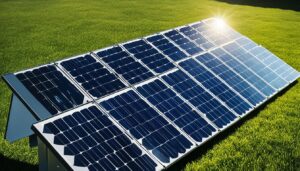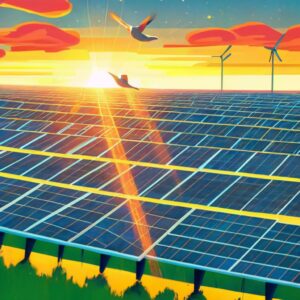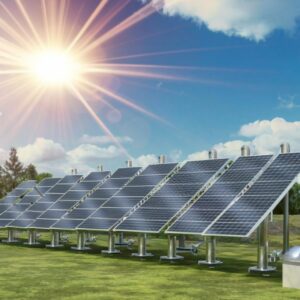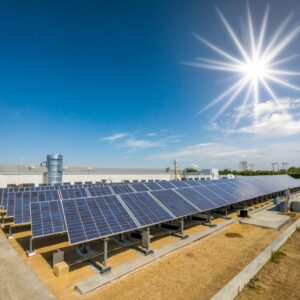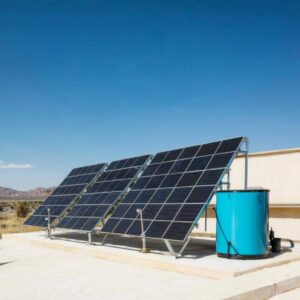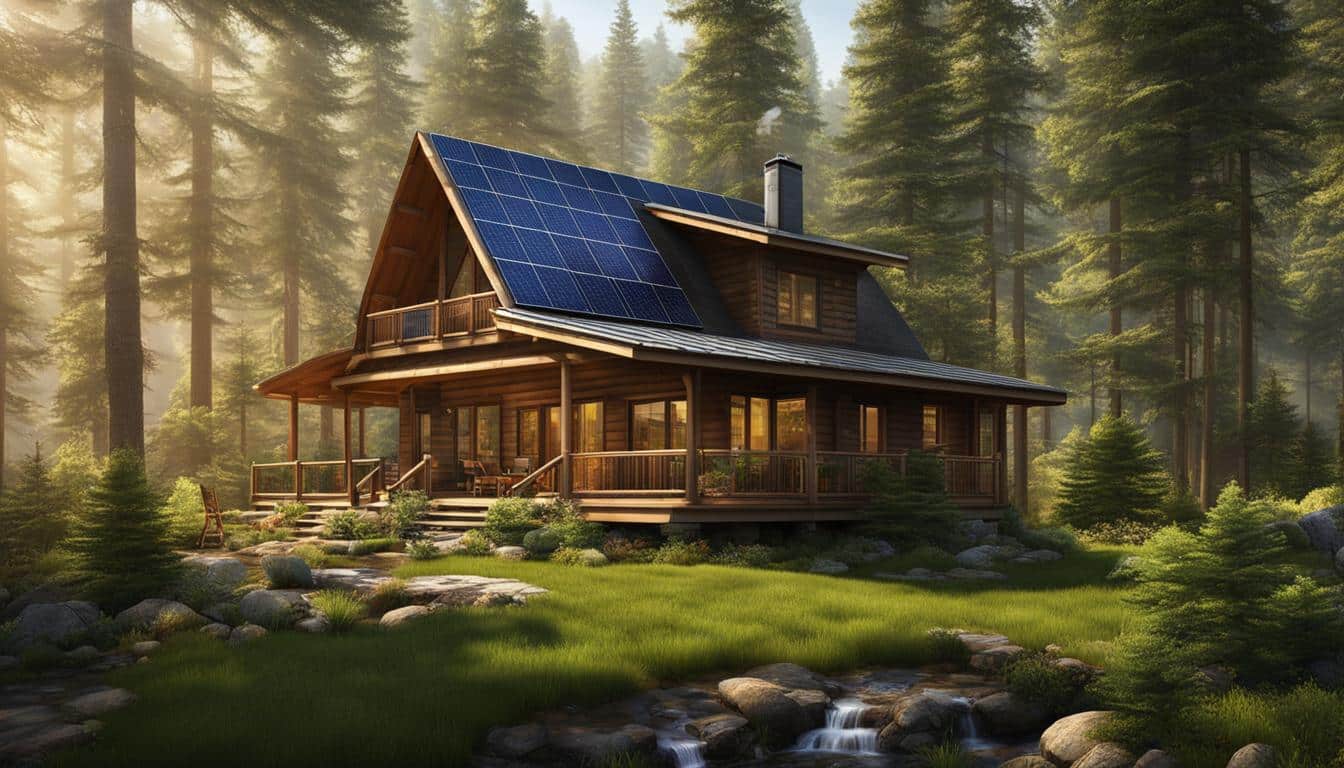
Living off-grid has gained significant popularity as more individuals seek sustainable and environmentally friendly lifestyles. One crucial aspect of off-grid living is harnessing the power of the sun to generate electricity and create solar powered homes.
In this comprehensive guide, I will explore the factors to consider when choosing the right solar energy system for your home. Whether you’re new to off-grid living or looking to upgrade your current system, this guide will provide valuable insights and expert advice.
Key Takeaways:
- Off-grid living allows individuals to embrace sustainable and environmentally friendly lifestyles.
- Solar power is a key element in creating off-grid homes.
- This comprehensive guide will help you choose the right solar energy system for your home.
- Consider factors such as energy needs, types of solar systems, panel efficiency, financial considerations, selecting a reliable installer, and maintenance.
- Proper maintenance and monitoring are crucial for the optimal performance of your solar energy system.
Understanding Your Energy Needs
Before investing in a solar energy system, it’s crucial to have a clear understanding of your energy needs. By assessing your current energy consumption, you can determine the appropriate size and capacity for your solar system. Consider the appliances, lights, and devices that you regularly use and their energy requirements.
Calculate your average monthly energy consumption by examining your utility bills over a period of time. This will provide a baseline for understanding your energy needs and help you make informed decisions about your solar energy system.
Now, let’s explore the factors to consider when evaluating your energy needs:
1. Appliance Usage
Take a careful inventory of the appliances in your home that consume significant amounts of electricity. These may include refrigerators, air conditioning units, heating systems, and water heaters. Consider how often you use each appliance and estimate their energy consumption.
2. Lighting Requirements
Take a closer look at your lighting setup. Determine the number and type of light bulbs you use throughout your home. LED bulbs are energy-efficient and can significantly reduce your energy consumption.
3. Future Expansion and Changes
Consider any future plans for expanding your living space or adding new appliances. Assess how these changes may impact your energy needs and adjust the calculations accordingly.
Tip: Keep in mind that as technology and energy efficiency improve, appliances are becoming increasingly energy-efficient. If you plan to replace old appliances, opt for energy-efficient models to further reduce your energy needs.
By understanding your energy needs, you can accurately determine the size and capacity of the solar energy system that will best fit your requirements. This will ensure that you maximize the benefits of your solar investment and reduce your reliance on grid-based electricity.
Now that we have a grasp on our energy needs, let’s explore the different types of solar energy systems available for residential use.
| Type of Solar Energy System | Description |
|---|---|
| Grid-Tied Systems | Connected to the utility grid, allowing you to sell excess energy back to the grid. Most common type of system. |
| Off-Grid Systems | Independent of the utility grid and require battery storage for excess energy. Ideal for remote locations or areas with unreliable grid access. |
| Hybrid Systems | Combine the benefits of both grid-tied and off-grid systems. Can operate both connected to the grid and as stand-alone systems. |
Types of Solar Energy Systems
When it comes to residential solar energy systems, there are several types to choose from, each with its own unique advantages. Understanding the different types of solar energy systems can help you make an informed decision for your home. Let’s explore the three main types:
1. Grid-Tied Systems
A grid-tied system is connected to the utility grid, allowing you to draw power from the grid when needed and sell any excess solar energy back to the grid. These systems are popular for their simplicity and cost-effectiveness. Grid-tied systems do not require battery storage and are ideal for homeowners who want to offset their electricity bills and take advantage of net metering programs.
2. Off-Grid Systems
Unlike grid-tied systems, off-grid solar energy systems operate independently of the utility grid. They require battery storage to store excess solar energy for use when the sun is not shining, such as at night or during cloudy days. Off-grid systems are commonly used in remote areas where connecting to the grid is not feasible or if you prefer complete energy independence. These systems provide reliable power even in the absence of grid electricity.
3. Hybrid Systems
Hybrid solar energy systems combine the benefits of both grid-tied and off-grid systems. These systems are connected to the utility grid but also have battery storage to store excess energy. Hybrid systems offer the flexibility of using grid power whenever needed and the option to switch to solar power during peak electricity demand or power outages. They provide the best of both worlds by ensuring a continuous power supply and reducing reliance on the grid.
Choosing the right type of solar energy system depends on your energy needs, location, and personal preferences. Consider factors such as energy consumption patterns, availability of net metering, and your desire for energy independence. Consulting with a reputable solar installer can help you determine the most suitable solar energy system for your home.
| System Type | Connection to Utility Grid | Battery Storage | Advantages |
|---|---|---|---|
| Grid-Tied | Connected | Not required | – Lower upfront costs – Ability to sell excess energy back to the grid – Benefit from net metering programs |
| Off-Grid | Independent | Required | – Complete energy independence – Reliable power in remote areas – No reliance on the grid |
| Hybrid | Connected | Required | – Flexibility to use grid or solar power – Continuous power supply during outages – Reduces reliance on the grid |
Evaluating Solar Panel Efficiency
When considering a solar energy system, evaluating solar panel efficiency is a critical step. The efficiency of solar panels determines how effectively they convert sunlight into electricity, ultimately impacting the overall energy output of your system.
Higher efficiency panels are capable of converting a larger percentage of sunlight into usable energy, resulting in increased electricity generation. This is particularly important for off-grid living, where maximizing the energy output is essential.
Look for solar panels with a high efficiency rating, usually expressed as a percentage. These panels are designed with advanced technologies and materials to optimize sunlight absorption and energy conversion.
However, it’s crucial to keep in mind that higher efficiency panels often come at a higher cost. While investing in panels with top-of-the-line efficiency can result in greater long-term savings, it’s important to consider your budget and evaluate the overall return on investment.
| Panel Efficiency Rating | Benefits | Considerations |
|---|---|---|
| High Efficiency Panels (Above 20%) | – Maximize energy output – Require less installation space – Suitable for limited roof space |
– Usually come at a higher cost – Longer payback period |
| Standard Efficiency Panels (15-20%) | – Lower upfront cost – Shorter payback period |
– Require more installation space – May not be suitable for limited roof space |
| Lower Efficiency Panels (Below 15%) | – More affordable upfront cost | – Larger installation space required – Lower energy output |
Consider your specific energy needs, available roof space, and budget when evaluating solar panel efficiency. Balance the initial investment with long-term energy savings to make an informed decision that aligns with your off-grid living goals.
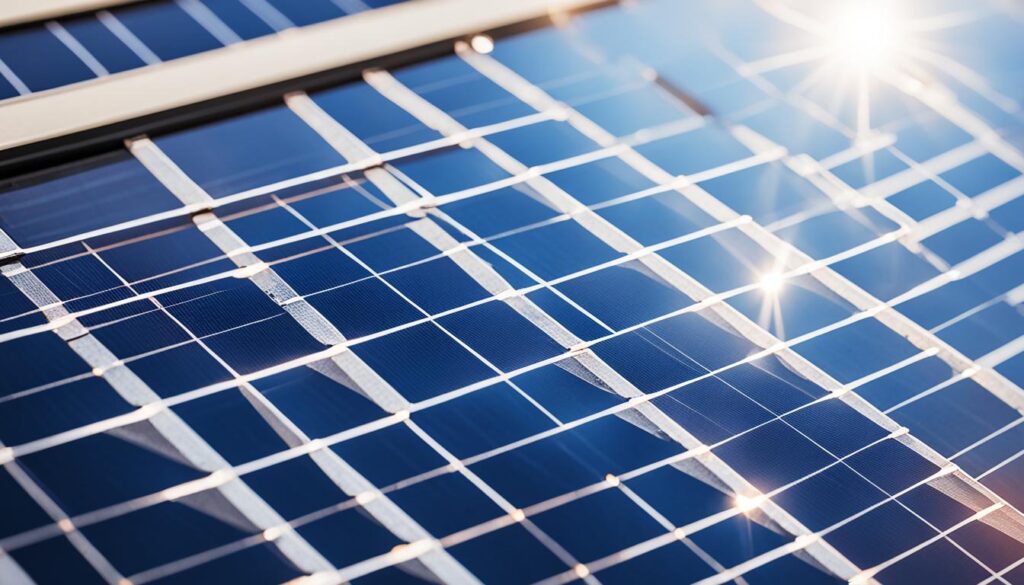
Financial Considerations
When considering the installation of a solar energy system, it’s important to evaluate the financial aspects to make an informed decision. While there are upfront costs involved, the long-term savings on utility bills can outweigh the initial investment.
Before proceeding, it’s essential to determine your budget and assess the return on investment (ROI) of the system. Consider factors such as the cost of the system, installation fees, and potential maintenance expenses. Evaluate your monthly energy expenses and calculate how long it would take to recoup your investment through reduced utility bills.
Additionally, research available incentives, tax credits, and financing options that can help offset the upfront costs. Many governments and utility providers offer financial incentives and rebates to encourage the adoption of solar energy systems. Some incentives may include cash rebates, tax credits, or grants. Familiarize yourself with the incentives available in your area to maximize your financial benefits.
Installing a solar energy system is an investment in energy independence and environmental sustainability. Despite the upfront costs, the long-term financial considerations often make solar power an attractive option for homeowners. By harnessing the power of the sun, you can reduce your reliance on traditional energy sources and decrease your carbon footprint while enjoying substantial savings on your utility bills.
Furthermore, many states offer net metering programs, allowing homeowners to receive credit for excess energy produced by their solar system. This means that if your solar panels generate more electricity than you consume, the excess energy can be fed back into the grid, and you can receive a credit from your utility company. This arrangement helps offset your energy consumption during times when your solar system may not generate enough electricity, such as at night or during inclement weather.
By carefully considering the financial aspects of installing a solar energy system, you can make a well-informed decision that aligns with your budget and long-term savings goals.
Choosing a Reliable Solar Installer
Selecting a reliable and experienced solar installer is crucial for the successful installation and long-term performance of your solar energy system. The expertise and reliability of your installer can directly impact the efficiency and reliability of your solar power system. To ensure you make the right choice, follow these essential steps:
- Research Local Installers: Start by researching local solar installers in your area. Look for established companies with a proven track record of successful installations and satisfied customers.
- Check Credentials: Verify the credentials and certifications of the solar installers you are considering. This information can help you determine their expertise and professionalism. Look for certifications such as NABCEP (North American Board of Certified Energy Practitioners) to ensure they meet industry standards.
- Read Customer Reviews: Read online reviews and testimonials from previous customers. This can give you valuable insights into the customer experience, workmanship quality, and overall satisfaction with the solar installer.
- Request Quotes: Contact multiple installers and request detailed quotes. Make sure the quotes include a breakdown of costs, equipment specifications, warranties, and any additional services they offer. Comparing quotes can help you determine the most competitive offer.
- Professional Advice: A reputable solar installer will provide professional advice tailored to your specific needs and budget. They should be able to assess your energy requirements, property suitability, and recommend the best solar energy system for your home.
- Permits and Paperwork: Ask potential installers about their process for handling permits and paperwork. A reliable installer will take care of all the necessary paperwork, ensuring proper permits and compliance with local regulations.
By following these steps, you can choose a reliable solar installer who will ensure the smooth installation of your solar energy system and provide ongoing support and maintenance.
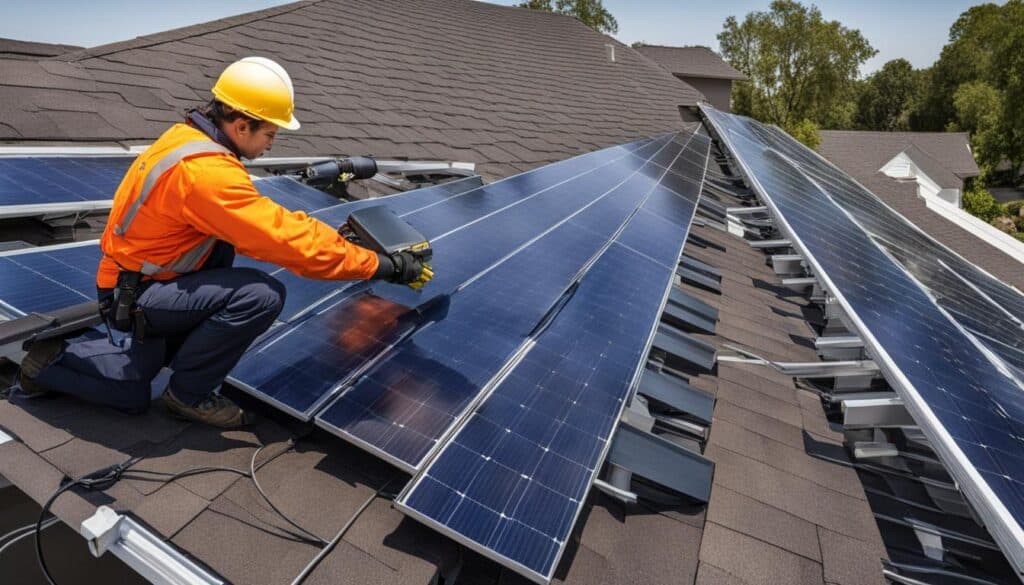
Maintenance and Monitoring
Proper maintenance and monitoring are essential to ensure the optimal performance of your solar energy system. By regularly inspecting and cleaning the panels, you can remove debris and maintain efficiency. Additionally, monitoring software provided by the manufacturer allows you to track the system’s performance and identify any potential issues.
“Regularly inspecting and cleaning the panels helps to remove debris and maintain efficiency.”
Furthermore, scheduling annual maintenance checks with your solar installer is crucial in identifying and addressing any potential problems early on. These routine inspections can help prevent major issues and ensure the longevity of your solar energy system.
| Benefits of Maintenance and Monitoring | Actions |
|---|---|
| Optimal Performance | Regularly inspect and clean panels |
| Issue Identification | Use manufacturer-provided monitoring software |
| Longevity | Schedule annual maintenance checks with installer |
By ensuring the proper maintenance and monitoring of your solar energy system, you can maximize its efficiency and lifespan. Take proactive measures to keep your system running at its best and enjoy the benefits of clean, renewable energy for years to come.
“Regular inspections and maintenance are essential to maximize the efficiency and longevity of your solar energy system.”
Conclusion
Choosing the right solar energy system for your home is a critical decision that requires careful consideration. Solar power offers a sustainable and environmentally friendly alternative to traditional energy sources, allowing you to reduce your carbon footprint and embrace off-grid living.
When selecting a solar energy system, start by assessing your energy needs. Calculate your monthly energy consumption and consider any future changes or expansions. This will help determine the size and type of system that is best suited for your home.
Evaluating panel efficiency is another important factor. Look for solar panels with high efficiency ratings to maximize the energy output of your system. While higher efficiency panels may come at a higher cost, they can ultimately save you money in the long run.
Additionally, consider the financial aspects of installing a solar energy system. Research available incentives, tax credits, and financing options to make the investment more affordable. Don’t forget to select a reliable solar installer who can provide professional advice and ensure the successful installation and long-term performance of your system.
Finally, proper maintenance and monitoring are essential to keep your solar energy system running optimally. Regularly inspect and clean the panels, and monitor the system’s performance using provided software. Schedule annual maintenance checks with your installer to address any potential issues and ensure the continued benefits of solar power.
In conclusion, by carefully assessing your energy needs, exploring different types of solar systems, evaluating panel efficiency, considering the financial aspects, selecting a reliable installer, and maintaining your system properly, you can enjoy the benefits of sustainable, off-grid living with a solar energy system. Embrace solar power and make a positive impact on the environment while reducing your reliance on traditional energy sources.
FAQ
What is off-grid living?
Off-grid living refers to living independently, without relying on the traditional utility grid for electricity and other basic services. It involves generating your own power through renewable sources, such as solar energy, and managing your own water supply and waste management.
What is a solar energy system?
A solar energy system, also known as a solar power system, is a setup that harnesses solar energy from sunlight and converts it into usable electricity. It typically consists of solar panels, an inverter, battery storage (for off-grid systems), and a metering system (for grid-tied systems).
How do I assess my energy needs?
To assess your energy needs, calculate your average monthly energy consumption by reviewing your utility bills. Consider the number of appliances, lights, and devices you use regularly. Additionally, take into account any future expansion plans or changes in your energy consumption patterns.
What are the different types of solar energy systems?
There are three main types of solar energy systems for residential use. Grid-tied systems are connected to the utility grid and allow you to sell excess energy back to the grid. Off-grid systems are independent of the utility grid and require battery storage for excess energy. Hybrid systems combine the benefits of both grid-tied and off-grid systems.
What is solar panel efficiency?
Solar panel efficiency refers to how well a solar panel converts sunlight into electricity. Higher efficiency panels convert more sunlight and generate more electricity, maximizing the energy output of your system. Efficiency is usually expressed as a percentage.
Are higher efficiency panels worth the cost?
While higher efficiency panels do come at a higher cost, they can be worth it in the long run. They generate more electricity in limited space, which may be beneficial if you have limited roof space. However, the value ultimately depends on your specific energy needs and budget.
How do I evaluate the financial aspects of a solar energy system?
When evaluating the financial aspects, consider your budget and evaluate the return on investment (ROI) of the system. Research available incentives, tax credits, and financing options. Additionally, check if your state offers net metering, which allows you to offset your energy consumption with excess energy produced.
How do I choose a reliable solar installer?
To choose a reliable solar installer, research local installers and check their credentials and customer reviews. Request quotes from multiple installers to compare costs and services. A reputable installer will provide professional advice, handle the necessary permits, and assist with the paperwork.
What maintenance and monitoring is required for a solar energy system?
Proper maintenance and monitoring are essential for the optimal performance of your solar energy system. Regularly inspect and clean the panels to remove debris and maintain efficiency. Monitor the system’s performance using monitoring software provided by the manufacturer. Schedule annual maintenance checks with your installer to identify and address any potential issues early on.
How do I reduce my carbon footprint with solar power?
By embracing solar power and using a solar energy system for your home, you can reduce your carbon footprint. Solar power is a clean and renewable energy source that reduces reliance on fossil fuels and lowers greenhouse gas emissions. Additionally, off-grid living reduces the overall demand on traditional utility grids.

